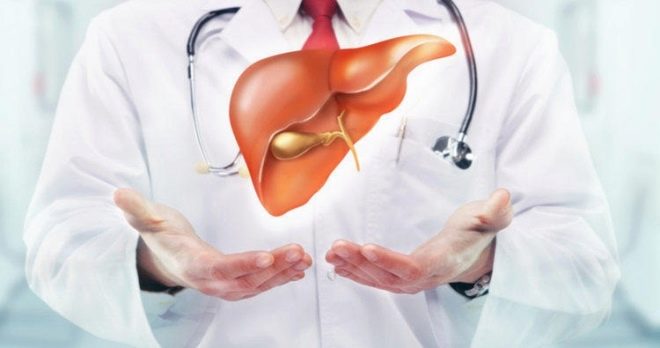Psychosomatics of liver diseases in children and adults
Liver disease is equally common among both the adult population and children. At the same time liver ailments are considered one of the common causes of early disability and death.
In this article we will look at some of the psychosomatic aspects of the diseases of the largest gland in our body.
general information
The liver is an organ of the digestive system. This is a large gland, on which different "duties" are imposed: it participates in metabolism, produces bile, necessary for digestion processes. The liver is a unique utilizer of toxins and various substances that can threaten the human body. Since the load on the liver is high, there are quite a lot of diseases of this gland.
From the point of view of evidence-based medicine, they are caused by three groups of reasons:
- viral lesions (viral hepatitis, half the cases of hepatitis lead to cirrhosis);
- bacterial and parasitic lesions (echinococcus, leptospirosis);
- structural and biochemical changes (fatty hepatosis associated with excessive deposition of fat in the liver cells, as well as alcohol damage, toxic damage).
Liver diseases are insidious. For a long time they can proceed completely unnoticed, without visible symptoms. When a vivid clinical picture appears, the lesions of the gland are usually quite substantial. Diseases can be acute and chronic.
All diseases are divided into viral (hepatitis), bacterial and parasitic (liver tuberculosis, abscess, ascariasis), hepatosis (metabolic or alcoholic fatty disease), tumor (cysts, sarcoma, cancer), vascular (hepatic hypertension), hereditary defects, posttraumatic lesions character
Symptoms of liver disease at first resemble a common viral disease - the person feels weak, gets tired quickly, gets tired. But then a rather characteristic sign appears - pain or a feeling of heaviness in the right hypochondrium. Usually these feelings suggest that the liver is enlarged.
Other symptoms include a bitter taste in the mouth, frequent painful heartburn, nausea.. Almost all liver diseases cause changes in the nervous system, and therefore a person becomes very irritable.
Psychosomatic causes
Considering the functional characteristics of an organ, which must always be “sufficient” (to produce the right amount of bile - no more and no less, to dispose of a certain amount of toxins, etc.), the psychology of liver diseases is based precisely on an imbalance. The liver hurts and is sick when a person is deficient in something in life. (love, money, food, attention), besides, he is very worried about this shortage, he is angry, annoyed, literally "comes out with bile."
When a person is physically hungry, the liver produces more bile. When a person experiences hunger on another, nonphysical level, the liver reacts to it in the same way, because for her there is absolutely no difference between the lack of food or the lack of love - the deficit is the deficit.
If the state of deficiency and shortage lasts for quite a long time and is accompanied by envy, anger towards those who have what they want, then serious gland lesions develop, including cancer, carcinoma.
Psychotherapists, observing people with various liver pathologies, studying their case histories, came to the conclusion that more than others are prone to such diseases people who try not to show their anger associated with a lack of love, money or happiness. They simply direct their feelings inward, often blaming themselves for everything. The hormones of cortisone and noradrenaline, which are produced in large quantities, constrict blood vessels, increase the level of blood pressure on the walls of blood vessels, in connection with which the heartbeat becomes more frequent, and suppresses immunity (this makes the hormone cortisone). The longer such exposure, the stronger the liver damage..
Psychological portrait of patients with liver pathologies, compiled by psychoanalysts, allows you to judge what actions, thoughts, behaviors can lead to cirrhosis or hepatosis, as well as to other lesions.
According to experts, a classic patient (adult) with liver problems is a person who is rather selfish, emotional, but prone to suppress emotions, rarely loving himself, but suffering immensely because others do not like him.
It is difficult for a person to find a balance, he is always small enough. Often liver pathology develops on the background of greed, reaching greed. Such people are envious, although they try to hide it.
Illnesses in children
Children's psychosomatics has its own nuances, and therefore liver diseases in children should always be considered taking into account the huge number of individual factors. Often Liver dysfunction is manifested in children whom parents put on display, of which they are proud, the very fact of birth of which more closely resembles the act of satisfying one's ego. for parents. “Our daughter already knows how to count in a year,” “Peter, in her three years, is a city champion in chess!”
Recently, pediatricians have noted an increase in the number of liver diseases in children. Officially, they try to explain this by fast food, the sedentary lifestyle of our children. But look carefully at your news feed in any social network: for sure you will find quite a few parents, who with pleasure and pride expose their child and his modest achievements for show.
There is nothing wrong with publishing photos from competitions where a child participated. But many people give it so much importance that the child simply cannot help but feel the constant burden of the parents' pride on their psyche.
The irritation of the child and his excitement that he may be mistaken (which is quite normal, by the way), that he will not meet the high expectations of his proud parents, causes an accumulation of repressed irritation and envy of freer and happier peers who do not need to bring a gold medal from each match.
Balance "I want-I-I need."
Another common the cause of children's liver pathologies lies in the opposite pattern of behavior - when offended by adults for lack of love, for lack of attention to the problems of the baby, for lack of recognition. The child climbs out of the skin: he draws, reads, studies on the fives, all the time trying to draw the attention of his parents, shows them his pictures and grades, but receives only a nod or meager praise. Mom is busy, dad once.
The insult and envy of peers, for whom parents are ill at competitions, and with them at the same time several thousand subscribers in social networks, accumulate in the soul. Excess bile accumulates, the liver is disturbed.
In adolescents and children of school age, the liver may be sick due to excessive intake of “toxic” toxic information for them, lack of spirituality. Toxins destroy not only the cells of the body, but also the structure of the soul, and therefore quite often pains in the area of the liver in adolescents are harbingers of depressive disorder.
Opinion researchers
Louise Hay in her books believed that liver problems begin with the accumulation of primitive emotions. Such patients are very "gall", they are more interested in material values than spirituality. They are angry, not inclined to change anything in their life or their worldview.
Canadian researcher Liz Burbo argues that liver problems - diseases of disappointed people who have accumulated so much bitterness in their souls that now it is manifested on the physical level by physiological bitterness - bile. She considers the opportunity to recover only through the prism of forgiveness: if a person lets go of negative experiences, her spiritual "bitterness", then the work of the liver is normalized.
Bodo Baginski indicates that need to look for imbalance of consumption. If jaundice means a person has consumed something more than the norm, if cirrhosis, the consumption is abnormal for a long time, and the person did not understand the signals demanding to change the organism.
The psychotherapist and homeopath Valery Sinelnikov points out suppressed irritation and anger to others as the main problem. He emphasizes, based on personal experience, that people with lesions of the liver often have sore joints, and also have problems with blood pressure.
Treatment
It is necessary to treat the liver only in a comprehensive manner - it is important to add psychocorrectional work to the medication, diet and therapy prescribed by the doctor. Without elimination of the internal cause, treatment will be ineffective.
If liver problems have already appeared, you need to learn calm not only external but also internal. It is important to honestly answer the questions: what exactly do you know about the measures, what poisons your life (or who), do you often complain to others, how high are your demands for yourself and your children, has the spiritual lost in the pursuit of the material? The answers will become a direction that will help make adjustments in your life.
If it is difficult to answer the questions yourself, there is not enough courage to admit that the disease has no one's fault, except for your own, it is better to seek help from a psychologist or psychotherapist. There are quite a few methods that teach a person to work with his inner anger, and also stimulate to reassess events and his own thoughts.
If the child has liver problems, in addition to the treatment of a pediatrician and a gastroenterologist, the parents should provide the child with the necessary psychological assistance - family psychotherapy sessions and classes for a child psychologist are helpful.

















